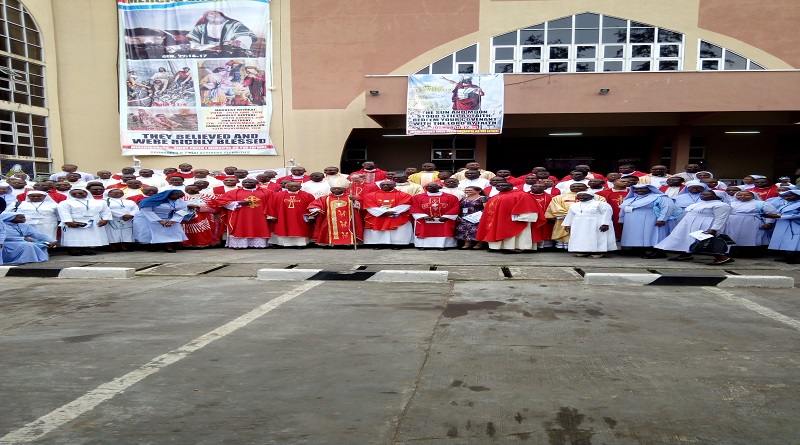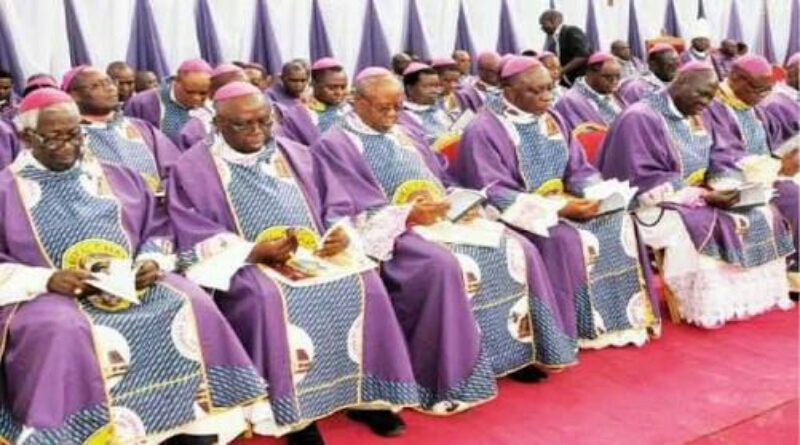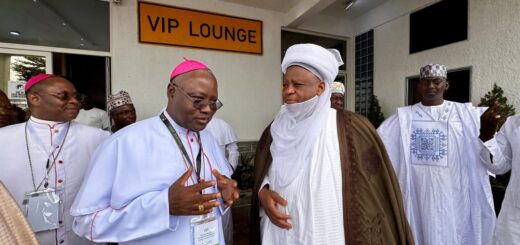KEYNOTE ADDRESS AT THE 15TH GENERAL ASSEMBLY OF THE CATHOLIC ARCHDIOCESE OF JOS
15TH GENERAL ASSEMBLY OF THE CATHOLIC ARCHDIOCESE OF JOS, 20TH TO 24TH AUGUST, 2017. KEYNOTE ADDRESS BY MOST REV. IGNATIUS A. KAIGAMA, ARCHBISHOP OF JOS.
We give thanks and bless God for giving us the opportunity to witness another General assembly, our annual forum during which we take a critical look at our pastoral and social programmes and how these affect our Archdiocese as we contribute to the overall development, welfare and progress of our Church, Plateau State and indeed Nigeria. I happily welcome you who are invited here to represent the parishes, pastoral areas, chaplaincies, religious congregations and Church societies. I welcome too our brothers and sisters from other Churches who are joining us in this opening ceremony.
I appreciate the presence of our civil dignitaries led by our Governor, His Excellency, Hon. Barr. Simon Lalong. We congratulate you, Your Excellency and the good people of Plateau State on the return of peace to our home of peace and tourism. The flurry of activities of local and foreign visitors in Plateau State is a demonstration of this. We must continue to do all possible to nourish and sustain this peace.
For some years now the Catholics of Jos Archdiocese have had to suspend our Christmas and Easter midnight Masses and especially our usual November Christ the King procession (in Jos from St. Theresa to Our Lady of Fatima Cathedral) in order not to provoke any unintended incident. We offered up this universal Catholic practice and tradition in our Archdiocese for that period for the sake of peace. We hope however, that we can resume it, because of the prevailing peaceful atmosphere.
The theme chosen for this year’s general assembly is: “The Message of Our Lady of Fatima – relevance to Nigeria”. We chose this theme because we believe that Nigeria is still grappling with insurgency, religious extremism and agitations from the North, East, West and the Niger Delta area and can benefit from the message and significance of Fatima. The need for Nigerians to work harder for peaceful coexistence and unity of the country cannot be over emphasized. The grumbles, mumbles and agitations from some quarters even if for good reasons, must not be allowed to degenerate dangerously into religious or ethnic hostility. These will only draw us back, with attendant loss of lives and property. The government must listen, take note and act fast (as in YCS motto: “see, judge and act”).
The message of our Lady of Fatima during her repeated apparitions to Francesco, Lucia and Jacinta in 1917 in Fatima Portugal, was about the need for peace in the world, at a time when the First World War was raging and huge numbers of human lives were being lost. The Blessed Virgin Mary is for us Catholics a very good model of peace, which is why we call her the “Queen of peace”. The Angel in Lk 1:28 calls her “full of grace”. Grace and peace are like identical twins. If Jesus is the Prince of peace, it is only natural that Mary, from whom the Prince of peace came, is herself an embodiment of peace because only peace can beget peace.
The devotion to the Blessed Virgin Mary is deeply enshrined in our Catholic tradition. Catholics acknowledge her as a very special human being; she is not divine as many non-Catholics accuse the Catholics of taking her to be. The Church has always and everywhere condemned the terrible heresy that would call her divine but venerates and honours her because of her very special role in salvation history. She is that woman, that virgin prophesied in Is 7:14: “a young woman who is pregnant will have a son and will name him Immanuel”. Equally, she is that woman in Rev. 12:1 “clothed with the sun with the moon under her feet and a crown of stars on her head”.
Her attributes of social sensitivity, kindness, purity, fear of God, good motherhood, humanitarian, contemplative disposition and many other virtues are her legacies for our imitation. When Jesus handed His mother to the disciple in John 19:26 and 27 saying “woman, this is your son” and to the disciple, “behold your mother,” Jesus was making a gift of his mother to all generations. As the disciple took Mary to his home, so is every disciple expected to take Mary to heart as a special woman, and this explains why Catholics honour and venerate her with such love and intensity.
I believe that the message of Mary given in 1917, against the background of a raging war, is very timely and will help us in our day to avoid provocative and hateful messages that can trigger conflicts. Her message will help us to appreciate the significance and relevance of peace in our homes, our Church, our State and indeed our nation. The peace we pray and work for must spring from the foundation of justice. When people perceive injustice, violence raises its ugly head. Justice which is the antidote to violence should also be the engine that propels peace.
I wish therefore, to dwell on three areas of Our Blessed Mother’s message in 1917 in Fatima which I believe are very relevant to our contemporary situation in Nigeria. These include: Reconciliation, Repentance and Peace .
RECONCILIATION: Reconciliation is the act of seeking to be at peace with another person. Mt.18:15-17 tells us the steps we should take to achieve reconciliation. Our Dialogue Reconciliation and Peace (DREP) Centre in Kwang – Jos, is a “temple” for such peace and reconciliation which is open to people of all tribes, religions as well as social or political groups. I encourage all to resort to the DREP Centre, a neutral venue for dialogue and settling of differences instead of reverting to violence and needless confrontations. We commend the Christian and Muslim religious leaders, as well as community leaders, who have been faithfully meeting at the DREP center every quarter in the past years. The Centre is helping individuals or groups to reconcile, and for some time now it has been engaged in peace education especially with the youths. The center had helped as a proactive measure to forestall violence and to teach the youths the need for dialogue instead of hostility and needless confrontation in solving problems.
REPENTANCE: Repentance is sorrow for sins with a strong determination like Zaccheus in Lk 19 to avoid engaging in such evil. It is no longer news that in our country today armed robbery, kidnapping, misuse of public funds, poor attitude to work, immorality, etc are still rampant. The Greek word “metanoia” means a change of heart, a change of direction from a bad way to a good way. Our attitude of self centeredness and corruption cannot lead our nation to that social paradise we all dream about and desire. It has been in the news that over four hundred billion Naira was allegedly paid to public officials as bribes in Nigeria between June 2015 and May 2016! Today, we cannot pretend that inflation is not a problem irrespective of what the economists say. The depreciation of the Naira has impacted negatively on all of us. Many Bishops and parish priests I meet tell how people besiege their offices asking for work, food, school fees, medical fees, rent, and even help to facilitate admission into schools or recruitment into military and paramilitary establishments, etc. , because our system in the country today is such that merit has no longer counts. Only those fortunate to know or be connected to influential or prosperous persons get jobs or positions that are considered to be good.
We commend many of our Church organizations such as St. Vincent de Paul in their humble charitable work in caring for the poor even though with little resources. The Catholic Caritas Foundation of Nigeria in Abuja oversees our Church’s social services and despite limited means, gets prompt help to people in need. Our Justice, Development and Peace office in Jos is engaged with widows, prisoners, internally displaced people and provides services such as wells, culverts, and even modest houses for victims of conflicts. This is done without discrimination. In fact, some of the major beneficiaries are non-Christian communities. The internally displaced people from the Boko Haram conflict areas, especially the ones in Bukuru are beneficiaries of our Church’s consistent and generous attention.
We must all do something for the poor no matter how poor we think we may be ourselves. Speak and fight for them. Service to the poor must be a priority of government. The 774 Local Government areas in Nigeria should not be merely ceremonial geographical entities. They should provide good water, schools, hospitals, roads etc, with the allocations they receive. We believe too that the Federal government should do more about social security, provision of social services, job opportunities and indeed a safe and secure environment. Nigeria has the capacity to do a lot for her people. We can build first class hospitals and manage them with great proficiency, build super highways, railroads and not the so-called federal roads riddled with valleys and trenches! We are still optimistic that a lot can be done for Nigerians. With the return of Mr. President from his medical vacation we pray for his good health so that he will be able to work for social cohesion, just and equitable distribution of resources and infrastructural development.
PRAYER: Nigerians are good at praying and fasting. However, prayer and good works must go together. What use is prayer if you see a brother or sister in need and say “go well?” Prayer creates an intimate union or bond with God Almighty and changes our perspective of things positively and transforms the way we look at people and treat them. Your prayer should not only be about yourself; pray for the other tribes, pray for humanity, pray for the whole world and even pray for your enemies. If you truly pray, you will develop a broad mind and a large heart to be able to love without conditions, see and treat all with dignity. Even if they differ from you, you will still respect their feelings and value them.
I see a slackening in the “Prayer for Political, Ethnic and Religious Peace in Plateau State” which we put together during our difficult period. This is perhaps due to the tangible peace being currently enjoyed on the Plateau. Let us continue the prayers and not be like those who see God as a police man God or a fire brigade official to be approached only when there is fire on the mountain.
I cannot conclude my address without mentioning our new Cathedral project, one important legacy you and I want, by the grace of God, to leave for the future generations. I wish to express sincere gratitude once again to you all for your monetary contributions and prayers. The much done there so far is the fruit of the policy of one block per Catholic, one bag of cement per Catholic family and the sacrifice of parishes, pastoral areas and chaplaincies in surrendering all tithes, harvest thanksgiving and bazaar proceeds. Foreign help is difficult to get nowadays but even without a kobo from outside, we have the first stage which is the substructure about 80% done; if it is completed, it means only 18% of the entire new cathedral project has been completed. As you can imagine, the cost of the project has doubled due to the devaluation of the Naira, and so we need to seriously review our strategies of collecting money to continue this huge project.
I note with gratitude that since our last General Assembly we have added nine new pastoral areas and we are happy with the pastoral progress in the Archdiocese. Let me remind us however, that the creation of pastoral areas, parishes or deaneries is for pastoral convenience. The Church does not have territorial control over any land. Land belongs to the Government. We have had the experience of some people saying that they cannot be under a parish or pastoral area reasoning that their chief is higher in status, or their market is bigger than where the headquarters is located or even that they cannot join the new parish or pastoral area because they are not of the same tribe! This is certainly not catholic reasoning. You are under no one but Jesus the Lord, alone.
The Archdiocese has also been challenged about the use of names for parishes or pastoral areas. Please note that the Church does not assign names to any geographical or political entity. She uses the names officially recognized by the government or as it is popularly used by people. Those who feel that the names the Church uses are incorrect should please go to the government to correct the names and inform the Church officially. The Archdiocese has no powers to assign or change names of areas or villages.
Having made this explanation and hoping it has been well understood, I have the honour and privilege of announcing an addition of a new deanery to the six existing ones. It shall be known and called “Zawan Deanery” with headquarters in Zawan. The following parishes and pastoral areas make up the new deanery:
1. St. William’s Parish, Zawan
2. St. Michael’s Parish, Anguldi
3. St. Joseph’s Parish, Du
4. St. Thomas’ Parish, Shen
5. St. Paul’s Pastoral Area, Kwata
6. St. Mary’s Pastoral Area, Maijuju
Our concluding Mass will be held in St. William’s Church, Zawan, to honour the parish from which many parishes and pastoral areas have been created. There is also the providential coincidence that the chief of Zawan, Da Christopher Mancha, a Knight of St John International (KSJ) and a Papal Knight of Pope St. Sylvester, one who has supported the cause of Catholicism in Plateau State and who keeps participating effectively in Church activities, will be celebrating his 70th birthday on that day. We shall pray with him and for him also at the occasion.
Dear brothers and sisters, let us continue to be one family, working happily, harmoniously and peacefully. May God bless our 15th general assembly which to the glory and honour of our Blessed Mother I now declare open. Glory to Jesus. Honour to Mary.




